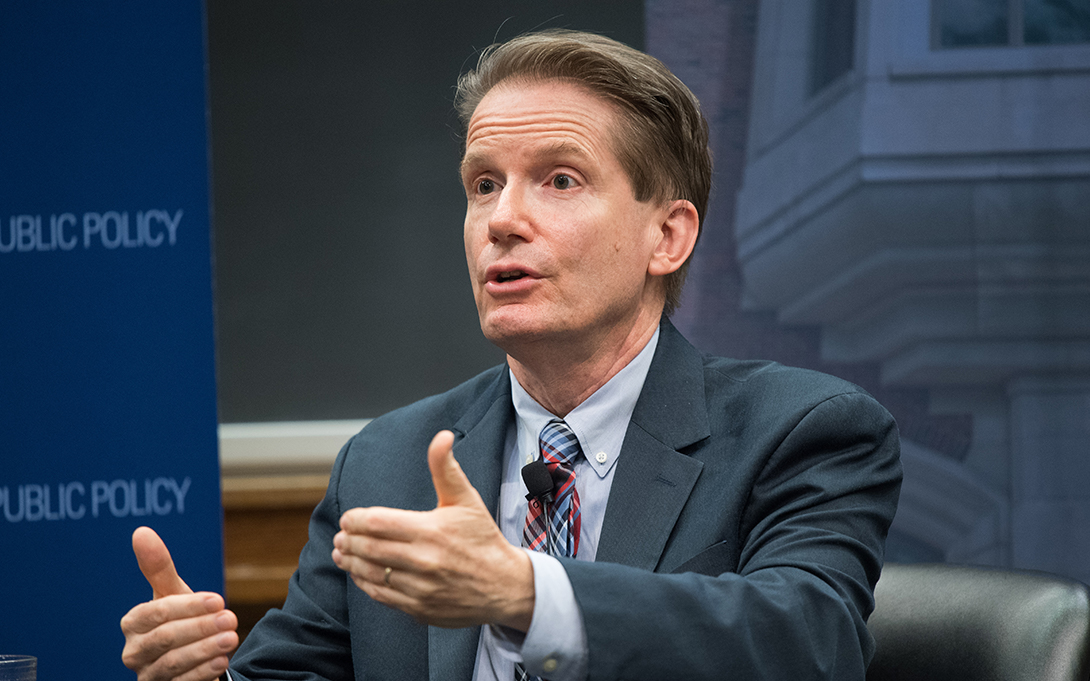
Barry Rabe, PhD, joins this episode of Michigan Minds to talk about his recent paper, “Carbon Pricing Enters Middle Age,” and discusses how carbon border adjustments can link future carbon pricing to international trade. Rabe is the J. Ira and Nicki Harris Family Professor of Public Policy at the Gerald R. Ford School of Public Policy, and the Arthur Thurnau Professor of Environmental Policy. His research examines the political feasibility and durability of environmental and energy policy, with a particular emphasis on efforts to address climate change in the United States and other nations.
There are many ways governments can try to reduce their carbon footprint, by reducing their emissions of carbon dioxide and other greenhouse gases, Rabe says. One concept that economists have been developing over many decades is carbon pricing. In effect, carbon pricing adds the costs of greenhouse gas emissions to the price of a particular product.
There are many ways governments can try to reduce their carbon footprint, by reducing their emissions of carbon dioxide and other greenhouse gases, Rabe says. One concept that economists have been developing over many decades is carbon pricing. In effect, carbon pricing adds the costs of greenhouse gas emissions to the price of a particular product.
“[Carbon pricing] can come through one of two forms. It can be a straightforward carbon tax—the way we tax other commodities like tobacco, like cigarettes, like alcohol—or a system called cap and trade, which works much the same way, but allows kind of market-based principles to operate and to work. Both of these tools are economically driven, and are designed to create incentives for using less of a commodity where we want to really make a transition. In this case, fossil fuels.”
Rabe’s recent paper, “Carbon Pricing Enters Middle Age,” was published on the fifth anniversary of his book, “Can We Price Carbon?” This work offers the first major political science analysis of the feasibility and sustainability of carbon pricing, and draws on a series of real-world attempts to price carbon over the last two decades in North America, Europe and Asia.
Currently in the United States, there is no national carbon price—the carbon price is zero. Although Congress has never adopted a carbon tax or national cap and trade system, Rabe notes that this is not the case for US trade partners. In fact, the European Union, the United Kingdom and Canada—which together represent about 40 percent of American trade—have all been developing fairly robust carbon pricing regimes.
“What do you do, in a world where national-level commitment to climate change is uneven?” Rabe asks. “And it may create incentives for nations to do less, because it’s cheaper for them to produce and even export their goods—enter carbon border adjustments, which has been an idea like carbon clubs or coalitions forming around trade issues. Could you put a fee or a tariff on imported goods, when they are being produced by nations that are not at the same level or commitment of climate policy as you are?”
Rabe says it’s too soon to know exactly how carbon border adjustments would work, or whether the US will adjust its position. One of the major developments he examines in his paper explores this uneven pattern across nations in how far they have gone on the issue of carbon pricing.
On Friday, June 9, Rabe will be attending the Wilson Center event, “A Transatlantic Dialogue: Carbon Pricing and the Energy Transition,” in Washington, D.C. Rabe will join representatives from the Environmental Change and Security Program (ECSP), the Global Europe Program and the Wilson Center’s Canada Institute to discuss the future of carbon pricing and carbon price adjustments. This event will be a livestreamed discussion that welcomes both online and in-person participants.
“The idea of this [event], along with the release of my paper, was to bring together scholars and policymakers from diverse settings and have a conversation, looking at the future development of carbon pricing,” he says. “Inevitably, the United States will need to find ways to cooperate in constructive ways with Europe, but also other nations around the world, as we make these shifts and changes, if we’re going to be successful in staving off the greatest threats from climate change. So this will be part of that ongoing set of conversations at the Wilson Center.”
Although the U.S. has a long way to go in terms of implementing policies that will positively impact our climate, Rabe reflects on the immense progress the nation has already made and emphasizes the importance of celebrating and learning from it.
“This issue of carbon pricing, as challenging as it has been politically, we’ve seen some really significant advances,” he says. “And yet, the challenges remain to effectively implement existing policies and make sure they’re durable, and then begin to weave together these different initiatives in a more global effort to confront this challenge.”

